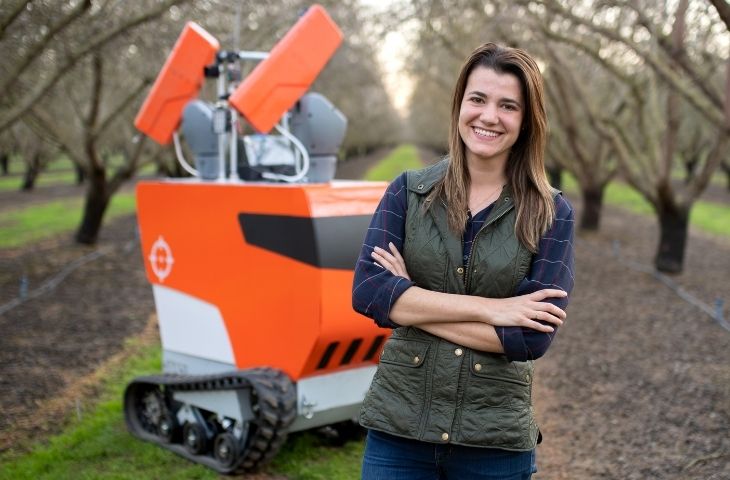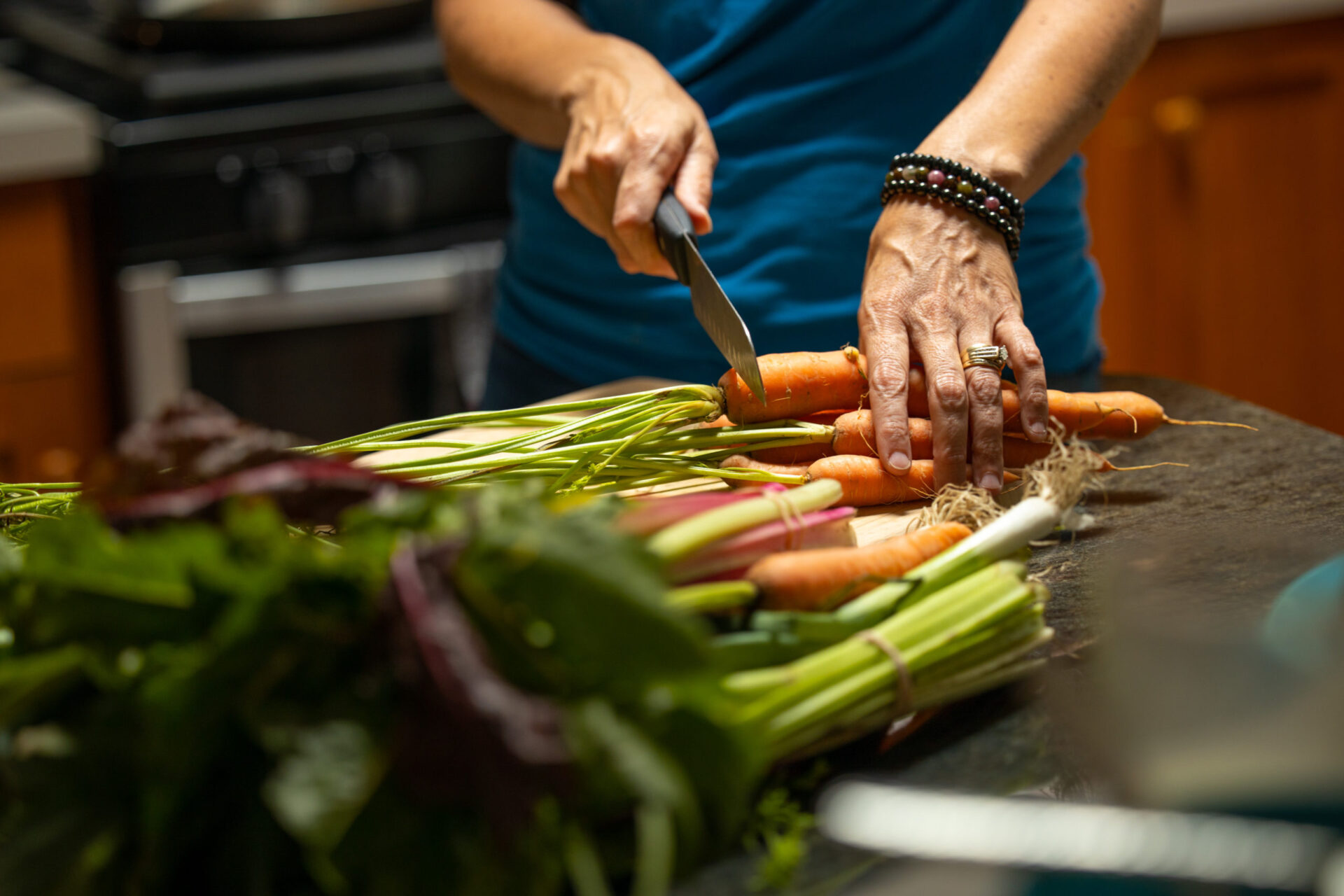Tech’s Growing Yield In Agriculture & Food Systems
Technology is playing an ever-increasing role in the world of agriculture and food systems. However, the current crop of Indiana tech companies making a noticeable impact in these areas might surprise you because they aren’t the conventional farming products and services you might think of when it comes to agriculture.
“I’m seeing companies coming out of places related to seed genomes, bovine in vitro fertilizations, crop protection, a variety of things applicable across the state and the world,” said Doug Applegate, program director for gener8tor, a Wisconsin-based accelerator that operates heavily in Indiana agriculture through its gBeta program.
“Agriculture is becoming an opportunity to provide solutions,” said Mitch Frazier, president and CEO of AgriNovus, a nonprofit working to fuel growth in Indiana’s agbioscience economy. “As we saw supply chains unravel during the pandemic it really showed us where food comes from, how things are sourced, and we have an opportunity to make a positive impact. You’re seeing a catalytic effect from investors and large corporations, in that it’s what they expect.”
This growth impacts Indiana, the United States and the entire world. The innovations and ideas grown in the Hoosier state could have a lasting impact not only on how food makes its way to our plates, but also in how we view our food systems from both very broad and incredibly small, local ways.
The Power of Data in Agriculture
One of the primary growth accelerators in the world of ag- and food-tech is the universe of possibilities made available through data analytics, and the power of big data framing and utilization.
InsightTRAC, a Syracuse, Ind.-based company, utilizes data—and their innovative, tank-like rovers—to aid the almond industry by removing pests from trees with astounding effectiveness. Founder and CEO Anna Haldewang sees data analytics as a way for large producers to think on a smaller scale.

“Right now growers think on an acre level, with tech we have the opportunity to get them to think on a tree level,” Anna explained. “The difference between one tree doing well compared to a second tree doing well, you have the potential – the data – to prove that a tree not doing well should be taken out and replaced. That’s going to improve yields overall.”
Improving yields is a hot topic. Populations continue to rise, and so does the demand for food. One of the keys to growing anything at all is pollination, and when we think of pollination our minds almost always turn to our favorite winged friends—bees.
Entrepreneur Ellie Symes had a personal interest in beekeeping and decided to make bees a part of her everyday life through The Bee Corp, which she co-founded in 2016. Ellie and her team make use of data through thermal images of bee hives to monitor health and productivity, and her efforts proved so impressive that she won the “Best of Tech” Rising Star Mira Award in 2018.

“We want to work with growers over time to understand the true number of hives they need to rent, reducing the number of hives and costs overall and also reducing the number of hives being shipped around the country and helping reduce stress on the bees,” Ellie explained. “This means that beekeepers can focus on the strength and health of their hives.”
Rian Mc Donnell sees the value of utilizing data from a different perspective—for when food has already made it to plates. The company he founded and runs, South Bend-based FloVision Solutions, helps companies cut down on food waste by placing imaging devices around trash bins in kitchens, cafeterias, and restaurants.
“Tech is hitting food systems because there are so many different problems, and so many different stakeholders, supply chains, and more,” Rian said. “It’s finally getting its claws into food, with a lot of it coming from the fact that people are starting to realize how bad the impact of food waste has on the world. I’ve been involved in this since 2018 and in the last 12-18 months there’s been a huge uptick in coverage of the impact of food waste.”
Growth Among Small Producers
Big data has also opened up new opportunities for innovation in how farmers get their food to market and how consumers buy it.
Market Wagon, an online ordering and delivery service for ordering produce, meat, dairy, and prepared foods from local farmers and artisan food producers, launched operations in 2016 with a goal of “democratizing the food supply”.

When asked what he meant by this, Market Wagon Co-Founder and CEO Nick Carter said that it’s all about “making the food supply as easy as possible to get to. We talk about farmers markets, and that’s what people think of when they think of local food. They’re not as easy to get to as Walmart, they’re open just four hours a week not 24 hours a day. For that reason the number of people able to adopt a local food diet is limited. With Market Wagon we can deliver everywhere, and we deliver twice per week.”
Doug Applegate of gener8tor reinforced the importance tech has in connecting smaller producers to consumers. “Last mile service is huge and is already big for smaller mom and pop farmers to do deliveries. Connecting to larger supply chains outside what you already have is big. There’s technology affecting small and local farmers as much as big ag. You even have virtual farmers markets, taking them out of a parking lot and going online for safety reasons.”
As our environment continues to change, innovation within how we grow our food is crucially important. AgriNovus’ Mitch Frazier pointed to Pure Green Farms based out of South Bend and GroPod©, a Heliponix LLC brand based out of Evansville as prime examples of tech operating on a small scale.
Pure Green Farms grows, packs, and ships leafy greens out of a climate-controlled hydroponic operation, and earlier this year received an investment from the massive California-based Taylor Farms.
Gropod gives people the power to grow vegetables, herbs, and specialty plants at home through a smart garden EcoSystem. Watch Gropod Founder and CEO Scott Massey’s TED Talk on how CEA—controlled environment agriculture—is helping revolutionize how we produce healthy food locally and sustainably.

“Through Gropod we’re reaching the limits of how much the current models of production can achieve, with an ever growing demand.” Scott said. “We’re working to make clean, healthy, tasty food more accessible for everyone while simultaneously using fewer resources and eliminating greenhouse gases.”
Heliponix won the Mira Award for Best New Tech Product in 2018 for its GroPod appliance and subscription model for nonperishable seed pods.
“This will bring opportunities for smaller growers and smaller grocers and suppliers to source produce locally, and everywhere in between,” Mitch said. “There’s a tremendous amount of opportunity to fuel that innovation and growth. As part of the overall mix it’s not an ‘OR’ but an ‘AND’ with the two—we do all we can to fuel innovation and unlock the power of data science while, at the same time, supporting emerging companies”
Feeding The World & Fighting Insecurity
Through the innovations in the utilization of data as well as the focus on making food readily accessible to more and more people, tech has a very real chance to reduce food insecurity in Indiana and around the world.
The focus on last mile access for fresh produce and locally produced food that Nick Carter is working on with Market Wagon is one way Indiana companies are making an impact. “It’s more efficient to deliver fresh food to the door than it is to go and open a grocery store where other stores have already failed,” Nick explained. “The market for groceries is not the same as in other communities. So, getting last-mile delivery into every community.”
Since the COVID-19 pandemic started in early 2020 Market Wagon has stepped up to try and make sure that shoppers who might not feel comfortable going into a grocery store had alternatives. In just nine months Market Wagon expanded into 29 new locations, delivering farm fresh food to customers in cities from Minneapolis to Birmingham, Ala., and from Buffalo, N.Y., to Kansas City, Mo.
Looking not only at food production, but how we consume food overall, FloVision’s Rian Mc Donnell feels that tech can help fight food insecurity in a variety of ways. “We’re focusing on food waste, but this technology can have that impact. We see ourselves as optimizing the food chain, showing companies when they need to produce less or put food in other places, leaving it to manufacturers to make their own choices.”
While not a tech company itself, AgriNovus operates heavily in the realm of ag tech. This year they are embarking on an ambitious project called “HungerTech” to strengthen our food systems and fight food insecurity.
Mitch Frazier of AgriNovus said that through HungerTech they are “looking to tackle things with food stamps, or SNAP, as an area we’re going to look at using funds to improve upon. We believe there’s a unique way to utilize SNAP to purchase groceries online; there are challenges on delivery and connectivity there as you can’t use SNAP for delivery.”
Tech’s Indiana Harvest
The world is changing, and with it so is Indiana. People are changing, the economy is changing, marketplaces are changing, and the climate is changing. Altogether, the needs of not only our nation but of the human race are changing rapidly, and Indiana tech companies are working diligently to address these needs.
Rian Mc Donnell sees the work FloVision does to cut down on food waste as not only a way to help companies save money, but as a way to fight for the future of our species. “If the world temperature increases by about five to six degrees, the human race can go extinct, so this is one solution that’s part of a larger plan to save the human race. This is a 100 year outlook, with all of these methods, to chip away at that carbon footprint.”
“With all the innovation here, and all the dollars and smarts here, Indiana should be the place this is happening,” said Mitch Frazier. “We can unite all of this to do good, and get food in the hands of people who need it as well as use this groundswell of activity to solve these problems.”
Here in Indiana agriculture is written into the very fabric of our state, but so is perseverance and an indomitable spirit of overcoming obstacles. We have the ability to create amazing things, to solve complex problems, and to help build a bright future for generations to come.









